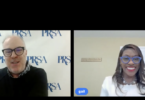Who can honestly say they grew up dreaming of one day landing a job in public relations? While there are exceptions to every rule, the answer is . . . not many.
PR, once viewed as a repository for ex-journalists who had crossed to the “dark side,” is fortunately no longer perceived to be a den of evil. However, the industry has for some time been a transient field that many tend to “fall into” and “out of” — particularly at the junior level.
In fairness, significant progress has been made in the pro-active recruitment of talent to the industry. Due largely to the hard work and dedication of educators at college campuses (including many of my PRSA colleagues), PR has become increasingly popular as a college major and the industry is attracting more and better talent than perhaps ever before. Moreover, over the past 15 years, PRSSA has seen a 62.5-percent increase in the number of chapters (currently 317; up from less than 200 in 1996).
However, let’s not let these facts delude us. For many bright young students, our industry is simply not on their radar. Even in a depressed economy where there is tremendous competition for PR jobs, many senior managers lament the dearth of industry talent. The reality is that PR does not (yet) compete with other industries that market to smart, young talent with “left brain” skill sets. We miss out on the opportunity to attract bright, young professionals who opt for careers in law, management consulting, entertainment and advertising. Let’s be honest — the industry has a very long way to go when it comes to elevating PR to be in the same consideration set as these industries.
Of course (while there are exceptions to the rule), PR is hard-pressed to compete with the financial compensation offered by a top-tier law or consulting firm. But what about those who enter fields like entertainment or advertising — and do so because they’re seeking “exciting” work or would like to find a job that can also be a creative outlet? Why wouldn’t we compete with those industries? The reality of the advertising industry is that only a select few ever rise to become creative directors and most will rarely be given a chance to flex their creative chops. The same holds true in entertainment.
Conversely, there has perhaps never been a more exciting and opportune time for young professionals to enter PR. As social media transforms the way we communicate, it has also revolutionized the role of the PR pro across all industry practice areas. As the only strategic discipline (save for HR and CRM) that truly specializes in two-way communications, PR often drives the social media and digital strategy for many brands and companies. Further, in today’s transformative media environment, where news and information travels at the speed of Twitter – and where interactions with media, influencers and consumers are played out on public platforms – the perceived and real value of PR within organizations has been elevated.
At the senior level, the strategic importance of PR continues to rise — especially as CEOs seek counsel while they grapple with the challenges and opportunities of operating within a “split-second” media cycle. At the junior level, the work is challenging, fast-moving and opportunities (not available in other professions) now exist to contribute to the creative process. As brands and companies look to populate their social media platforms with rich and compelling content that will advance their SEO objectives, in many cases PR is leading or influencing the creative process. The lines between the disciplines have blurred and young PR pros who may once have been constrained to serve primarily as the procurers of earned media are now also able to help act as the curators and developers of content.
As our industry continues to heighten in relevance and value, and we’re entrusted with increasing levels of responsibility and influence within our respective organizations, we need to do a better job of merchandizing the unique opportunities offered by a career in PR. It is both critical to the profession and to our individual success.
We’re at a critical moment for PR. As more brands and companies are allocating budget to their digital initiatives, PR pros are rightfully being held more accountable for than ever before for the campaigns that we help to craft – especially as sophisticated new measurement tools have heightened the ability for us to measure the effectiveness and impact of our programs.
For senior-level professionals to be successful in delivering results and in elevating our roles within our respective organizations, we need to have “bench strength.” For both the present and future growth of our industry, it’s absolutely imperative that we recruit and cultivate top talent. Not only does PR deserve to compete for the best and brightest but the future growth of our industry depends on our ability to successfully do so.
Joseph Cohen, APR, serves on the PRSA Board of Directors and is also a group vice president at MWW Group, where he helps oversee a number of the company’s top consumer lifestyle marketing accounts, including Sara Lee Corporation, Nutrisystem, 1-800-Flowers.com and Gold’s Gym, among others.







Joe great blog. It got me thinking. All of the exciting things that you talk about in regards to the PR profession such a brand consulting, management counsel, digital frontier, etc are all related to the inner workings of business, be it for profit, non-profit or even the business of government. Every day we PR professionals work with our clients on communicating business related issues of bottom line importance.
Yet when you ask…How does the profession attract the best and brightest?… I think….Where do those that think they are the best and brightest business minds go? Yep, they go right to the business school. That’s where they think they will make the big bucks. So, then I ask, why the hell is the PR profession, which is inextricably part of business, housed in the Liberal Arts? We are a huge element of business yet, in our higher education setting, we are positioned as anything but that.
I know I will endure thew rath of every PRSA educator on the planet but people, STOP and think. We counsel our client’s on the intricacies of positioning every day and yet we have positioned ourselves out of this perceived “big career” market. We talk about how we compliment marketing and advertising all time. So then why isn’t PR and/or all communications, for that matter, part of the business school?
I am tired of hearing how we want a seat in the board room or that we want to be part of the C-suite. If we want to “attract the perceived best and brightest”; if we want to be a “big money” profession or if we really want an office in the C-suite, then let’s re-think where our profession should be positioned from day one. I think it should be housed in the business schools of the colleges and universities around the country.
Joe, I applaud you for challenging us on this all important subject. Professional advancement only happens when old ideas are challenged. And old ideas become new ideas when the words “we can’t do it that way because” are extricated from the lexicon of change.
Bob Frause
Thank God PR does not make it on to the “short list” of careers for the best and the brightest. Finance and Wall Street alchhemy has stolen away the people that could figure out a way to make pot-hole free asphalt or an energy efficient way to deslanize water. PR is a marketing supplement – w/o a real business it rarely holds its own.
And senior PR folks are “non-plussed” by today’s currrent students? That blame resides with those who place ads seeking twitter, facebook and flickr experts – above those who can actually write a gramatically correct sentence.